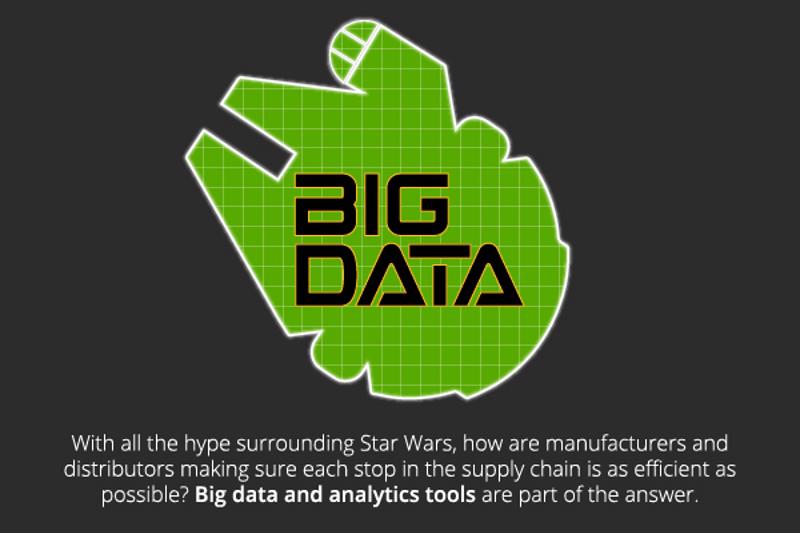The new Star Wars movie, “The Force Awakens,” opened in theaters last weekend to much critical acclaim and excitement from original proponents and new fans alike. Manufacturers and distributors have been abuzz with new marketing techniques and products to take advantage of the resurgence of this popular franchise, and the question of whether or not their efforts are successful all comes down to an efficient supply chain, good product design and effective marketing channels.
With all the hype surrounding this fan favorite, how are manufacturers and distributors making sure each stop in the supply chain is as efficient as possible? Big data and analytics tools are part of the answer – one might even say they are the Force behind an effective supply chain. Let’s take a look at some of the ways businesses use data to ensure efficiency within their operations:
1. Create one supply chain organization
It’s important to build efficiency into the supply chain, and it’s even more integral that this efficiency is fostered in every step of the process – especially in the strategic planning stages. In the modern world, businesses deal with increasingly complex production and distribution networks. It’s becoming critical for companies to exploit opportunities within the supply chain to improve profitability and foster business growth, and having one organization that oversees this field is one option to take out some of that added complexity.
“The times of managing the supply chain in separate tiers is over,” wrote Christoph Glatzel, Alex Niemeyer and Johannes Rohren of McKinsey and Company in 2014. “Sophisticated data analysis enables companies to manage supply chains end to end and, in industries such as retail, almost in real time.”
By creating only one organization responsible for supply chain excellence across marketing, manufacturing and procurement tiers, companies can pave the way for data-driven decision-making that can improve efficiency across the board.
2. Use the Force of big data to its fullest potential
The excitement surrounding the new Star Wars movie was – and continues to be, even after opening weekend – palpable. The creativity spawned by big-name movie franchises like this one often manifests in new products like children’s beds made to look like the Millennium Falcon or coffee creamer in droid-shaped bottles. In order to get these products from point A to point B in the most efficient manner, companies need to take advantage of big data and create a supply chain that not only is efficient but also endeavors to maintain product quality from end to end.
Forbes contributor Louis Columbus noted that big data – both structured and unstructured – is creating ways for organizations to improve contextual intelligence and thus drive collaboration along every step of the supply chain. Machine-generated data, ERP transactions and traffic density measurements are all examples of the kind of information that can be aggregated to inform decisions. For instance, Evelyn MacLean-Quick, the vice president of strategic sourcing for global supply chain at Hess Corp, noted during a Dec. 1 presentation that the oil and gas industry, especially, needs to harness these kinds of big data tools to generate change and transform the supply chain, according to Rigzone.
 Manufacturers and distributors use the Force of big data to keep track of the supply chain.
Manufacturers and distributors use the Force of big data to keep track of the supply chain.3. Invest in analytics tools
The most important part of using big data to drive decision-making across an organization is having the right tools to analyze that information. Therefore, in order to ensure processes are streamlined and there is little to no waste in the supply chain, investing in analytics tools is a crucial first step on the way to that transformative process that MacLean-Quick referred to. Therefore, in order to ensure processes are streamlined and there is little to no waste in the supply chain, investing in analytics tools is a crucial first step. Leveraging Oracle Supply Chain Management and Logistics Management technologies, Inspi
Contact Inspirage today for more information about how Oracle solutions like VCE applications can help organizations use the Force of big data to improve efficiency in the supply chain.